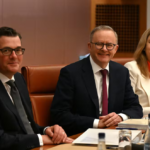A universal basic income might get us through the Covid recession

A year ago I advocated for the drastic reform of Australia’s welfare system through the introduction of a Universal Basic Income (UBI), to be funded by equally drastic taxation reforms.
At that time I considered it appropriate to phase in such reforms over many years, to allow for detailed analysis and a robust implementation with ongoing monitoring & refinement through an extended transition period.
Now however, the drastic situation created by Covid-19 warrants a more drastic implementation timescale, because a universal basic income (UBI) is well-suited to addressing the climate of fear and uncertainty created.
I expand on this point below, but first, to recap on some key points I previously argued: Contrary to popular commentary, the most critical feature of a UBI is not that it would be given unconditionally, even if people don’t look for work – in fact it needn’t necessarily be so – but rather that – unlike existing benefits– it would not be withdrawn when someone does find work.
This would tackle the major disincentives to work that are currently faced by welfare recipients as they incur punishingly-high effective marginal tax rates – sometimes over 100% – as their benefits are rapidly withdrawn when they gain paid work.
Instead – and to partly fund the UBI – the existing tax-free allowance would be replaced with a relatively low minimum tax rate (say 20-25%) applied to all income, followed by progressively higher tax rates so that when a certain, much higher level of pay is reached, no net benefit is received.
Thus the concerns often expressed about a UBI – that it would not be targeted on those most in need and would also be a disincentive to work – are quite misplaced, because actually the opposite is the case.
Furthermore, with a UBI providing a minimum income in place of minimum pay rates, marginal new employment opportunities would be created for those willing to work at lower rates such as seniors wanting to top up their pension through semi-voluntary community work, where part of the benefit they gain – to compensate for lower pay rates – is the enjoyment of community interaction.
Turning to the present circumstances of Covid-19 – this is not like the “global financial crisis” of 2008/09, when there was an underlying demand to continue economic activity as usual if confidence in the financial system could be maintained through fiscal stimulus measures.
On the contrary, during the initial phase of virus suppression, a situation most of the world is still in, the health objective – requiring human & economic activity to be shut down – is diametrically opposed to an economic stimulus strategy.
Even now as Australia attempts to return to something more “normal”, there remains the risk of a second wave of infections, notably in Victoria presently, which raises the risk of further economic shut downs. Plus there is the certain spectre of an unavoidable recession and impending cuts to Covid-19 budget-support measures this coming September or not long after.
And on top of all that, we have large numbers of people who have, over recent years, been pushed into casual employment that leaves them with no certainty of future income even in the best of times.
How then in this environment can one possibly instill confidence amongst consumers to spend in the economy or businesses to invest, when the most rational reaction for most of us would be to save any extra “stimulus” money we may be given for the worsening times ahead?
The answer to that is in the reverse of the question -people have greater confidence when they are less worried about the future. Now we may not be able to guarantee that everyone’s income will continue in the future at whatever level it was, but we can at least guarantee that they will have enough to survive – and that’s what a UBI does.
And with that guaranteed future income it becomes far less risky to spend any spare change you may currently have or be given through further stimulus measures. This improved prospect of future spending may in turn give businesses greater confidence to invest and hire employees.
So ironically, if we focus on people instead of businesses and employment, we are more likely to give people the confidence that will support the extra jobs and economic activity that people desire.
Finally, though it may not be a permanent feature, an unconditional and universal basic income will be an effective means of ensuring everyone affected by current Covid restrictions is able to survive, whilst any excess income they may end up with is automatically recovered through a more progressive tax system.
This will be a lot more efficient and fair than the current situation where some people have been lucky to receive a doubled rate of NewStart (as “JobSeeker”) whilst many – not least artists and other casual workers who have kept us entertained and our cities serviced through shutdowns, or others still recovering from bushfires – fall through the cracks because they don’t meet the eligibility criteria.

Dr David Thorp is an analytical, strategic reformer who works in the field of public service strategy. His interests include finance, economics, transport, housing, sustainable energy and social services.












